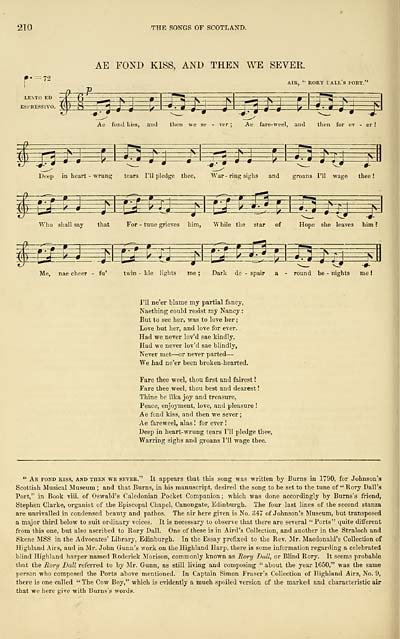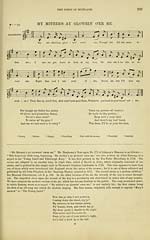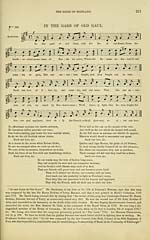Glen Collection of printed music > Printed music > Wood's edition of the songs of Scotland
(236) Page 210 - Ae fond kiss, and then we sever
Download files
Complete book:
Individual page:
Thumbnail gallery: Grid view | List view

210
THE SONGS OF SCOTLAND.
^• = 72
ESI'RESSIVO.
m
JL
AE FOND KISS, AND THEN WE SEVER.
AIR, " KORY LALL'S POUT."
— m< i
=K=
»
m
*
^
i-^-^— * — v-
iS^s
=?
Ae fond kiss, and then we se - ver ; Ae fare- weel, and then for ev - er !
I
H
^-
?
»— *-
-C
fi^t^^
^-*-*—
Deep in heart - wrung tears I'll pledge thee, War- ring sighs and groans I'll wage thee!
pS^Egg=S^pgiS
s
: F£
-* — *-
¥^
Who shall say that For - tune grieves him, While the star of Hope she leaves him?
EfeS
m
:i=F
glE^^=^g^l@g| B5j ^
Me, nae cheer - fu' twin - hie lights me ; Dark de - spair a - round be - nights me !
I'll ne'er blame my partial fancy,
Naething could resist my Nancy :
But to see her, was to love her ;
Love but her, and love for ever.
Had we never lov'd sae kindly,
Had we never lov'd sae blindly,
Never met — or never parted —
We had ne'er been broken-hearted.
Fare thee weel, thou first and fairest !
Fare thee weel, thou best and dearest !
Thine be ilka joy and treasure,
Peace, enjoyment, love, and pleasure !
Ae fond kiss, and then we sever ;
Ae fareweel, alas ! for ever !
Deep in heart-wrung tears I'll pledge thee,
Warring sighs and groans I'll wage thee.
" Ae fond kiss, and then we sever." It appears that this song was written by Burns in 1790, for Johnson's
Scottish Musical Museum ; and that Burns, in his manuscript, desired the song to be set to the tune of " Rory Dall's
Port," in Book viii. of Oswald's Caledonian Pocket Companion ; which was done accordingly by Burns's friend,
Stephen Clarke, organist of the Episcopal Chapel, CanoDgate, Edinburgh. The four last lines of the second stanza
are unrivalled in condensed beauty and pathos. The air here given is No. 347 of Johnson's Museum, but transposed
a major third below to suit ordinary voices. It is necessary to observe that there are several " Ports" quite different
from this one, but also ascribed to Rory Dall. One of these is in Aird's Collection, and another in the Straloch and
Skene MSS in the Advocates' Library, Edinburgh. In the Essay prefixed to the Rev. Mr. Macdonald's Collection of
Highland Airs, and in Mr. John Gunn's work on the Highland Harp, there is some information regarding a celebrated
blind Highland harper named Roderick Morison, commonly known as Eory Dull, or Blind Rory. It seems probable
that the Rory Dall referred to by Mr. Gunn, as still living and composing " about the year 1650," was the same
person who composed the Ports above mentioned. In Captain Simon Fraser's Collection of Highland Airs, No. 9,
there is one called " The Cow Boy," which is evidently a much-spoiled version of the marked and characteristic air
that we here give with Burns's words.
THE SONGS OF SCOTLAND.
^• = 72
ESI'RESSIVO.
m
JL
AE FOND KISS, AND THEN WE SEVER.
AIR, " KORY LALL'S POUT."
— m< i
=K=
»
m
*
^
i-^-^— * — v-
iS^s
=?
Ae fond kiss, and then we se - ver ; Ae fare- weel, and then for ev - er !
I
H
^-
?
»— *-
-C
fi^t^^
^-*-*—
Deep in heart - wrung tears I'll pledge thee, War- ring sighs and groans I'll wage thee!
pS^Egg=S^pgiS
s
: F£
-* — *-
¥^
Who shall say that For - tune grieves him, While the star of Hope she leaves him?
EfeS
m
:i=F
glE^^=^g^l@g| B5j ^
Me, nae cheer - fu' twin - hie lights me ; Dark de - spair a - round be - nights me !
I'll ne'er blame my partial fancy,
Naething could resist my Nancy :
But to see her, was to love her ;
Love but her, and love for ever.
Had we never lov'd sae kindly,
Had we never lov'd sae blindly,
Never met — or never parted —
We had ne'er been broken-hearted.
Fare thee weel, thou first and fairest !
Fare thee weel, thou best and dearest !
Thine be ilka joy and treasure,
Peace, enjoyment, love, and pleasure !
Ae fond kiss, and then we sever ;
Ae fareweel, alas ! for ever !
Deep in heart-wrung tears I'll pledge thee,
Warring sighs and groans I'll wage thee.
" Ae fond kiss, and then we sever." It appears that this song was written by Burns in 1790, for Johnson's
Scottish Musical Museum ; and that Burns, in his manuscript, desired the song to be set to the tune of " Rory Dall's
Port," in Book viii. of Oswald's Caledonian Pocket Companion ; which was done accordingly by Burns's friend,
Stephen Clarke, organist of the Episcopal Chapel, CanoDgate, Edinburgh. The four last lines of the second stanza
are unrivalled in condensed beauty and pathos. The air here given is No. 347 of Johnson's Museum, but transposed
a major third below to suit ordinary voices. It is necessary to observe that there are several " Ports" quite different
from this one, but also ascribed to Rory Dall. One of these is in Aird's Collection, and another in the Straloch and
Skene MSS in the Advocates' Library, Edinburgh. In the Essay prefixed to the Rev. Mr. Macdonald's Collection of
Highland Airs, and in Mr. John Gunn's work on the Highland Harp, there is some information regarding a celebrated
blind Highland harper named Roderick Morison, commonly known as Eory Dull, or Blind Rory. It seems probable
that the Rory Dall referred to by Mr. Gunn, as still living and composing " about the year 1650," was the same
person who composed the Ports above mentioned. In Captain Simon Fraser's Collection of Highland Airs, No. 9,
there is one called " The Cow Boy," which is evidently a much-spoiled version of the marked and characteristic air
that we here give with Burns's words.
Set display mode to: Large image | Transcription
Images and transcriptions on this page, including medium image downloads, may be used under the Creative Commons Attribution 4.0 International Licence unless otherwise stated. ![]()
| Special collections of printed music > Glen Collection of printed music > Printed music > Wood's edition of the songs of Scotland > (236) Page 210 - Ae fond kiss, and then we sever |
|---|
| Permanent URL | https://digital.nls.uk/91340575 |
|---|
| Description | Scottish songs and music of the 18th and early 19th centuries, including music for the Highland bagpipe. These are selected items from the collection of John Glen (1833 to 1904). Also includes a few manuscripts, some treatises, and other books on the subject. |
|---|
| Description | The Glen Collection and the Inglis Collection represent mainly 18th and 19th century Scottish music, including Scottish songs. The collections of Berlioz and Verdi collected by bibliographer Cecil Hopkinson contain contemporary and later editions of the works of the two composers Berlioz and Verdi. |
|---|

